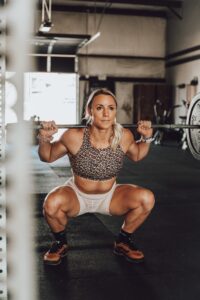
If you've been hitting the gym, and worry about weight lifting and varicose vein risk factors, you've come to the right place! After all, lifting is meant to keep you strong and healthy. But it can't do that if the workout hurts your veins!
Now, this worry doesn't come from nowhere. Anyone who's squatted weights has likely noticed veins becoming more prominent. As such, it's only natural that you'd worry this would be a permanent effect. So, to help you keep on track with your workouts, and your vein health, we're spilling the tea on lifting weights and other varicose vein risk factors.
These are veins that become visible through the skin because they're dark or enlarged. Those changes occur because excess blood builds up in the veins because of problems with their valves. Now, why is pooling blood a problem? Well, your veins most important job is to get blood out of the extremities and to the heart. When functioning optimally, the vein valves help that blood flow against gravity, closing to prevent reflux (blood that flows back down to the legs and feet.)
Unfortunately, when valves sustain damage, you develop venous reflux, allowing blood to flow backward, creating pooling and the bulging problem of varicose veins.
venous reflux is often the result of genetics—if your parents developed varicose veins, you have a higher risk for this condition. Still, other factors such as your age, pregnancy, menopause, blood clots and obesity are also varicose vein risk factors.
Sometimes, your job can increase your risk as well, especially if you have to sit or stand all day. For that reason, nurses, teachers, and hairdressers all have an elevated risk for varicose veins.
Your birth-assigned sex is also a varicose vein risk factor, as women develop varicose veins more frequently. Why? Well, women are the ones who experience pregnancy, and that's one of the most significant risk factors for varicose veins, because of the extra weight and blood you carry during those nine months, stressing out your valves.
Luckily, getting more exercise can minimize gender-specific varicose vein risk factors. But that's only true if you work out with caution. So, now, we'll finally get back to discussing weightlifting and varicose veins.
The short answer is no! While veins may become more prominent during weight lifting, that rarely becomes a permanent problem. Instead, exercising regularly decreases your risk for varicose veins by boosting circulation.
Now, you still need to exercise caution (literally): If you lift very heavy weights, the pressure could be enough to damage your vein valves. However, that damage would develop slowly, over time. So even if you've been upping your weight limits, it's not too late to prevent vein damage.
First, always check your form and only lift when you have a spotter. You also need to work rest days into your schedule. It may also be wise to don compression socks when you lift, to further protect your veins and boost blood flow.
Do you already have varicose veins, and painful symptoms are slowing your gym roll? It's time to get in to and see our Georgia vein specialists, to make sure you're training safely!
Sources: Shape Magazine

Scheduling
Please contact our dedicated specialists to schedule a consultation today.
2024 Georgia Endovascular. All rights reserved. Website Design by Healthcare Success